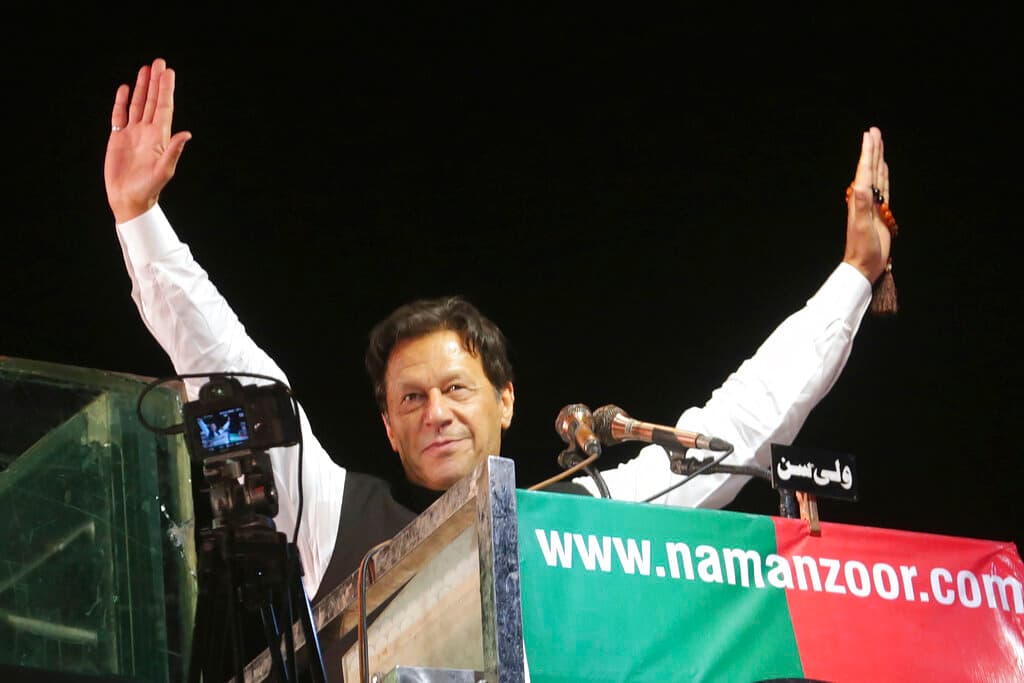Warrant Against Pakistan’s Imran Khan Is Rooted in Rift With the Military
In one public appearance the former premier called on mid-rank military officers to join his mass demonstrations against the new government.

Arrest warrants against ex-Pakistani premiers are par for the course. Today’s case against Imran Khan, however, could land the charismatic former cricket star in deeper trouble than usual, as it is rooted in a growing rift with the all-powerful military.
Supporters of Mr. Khan, the former prime minister who was ousted in April in a parliamentary no-confidence vote, vowed to block anyone attempting to execute today’s arrest warrant. Formally, Mr. Khan is accused of incitement against the police and the judicial system. The arrest warrant was deferred for a few days, pending an appeal.
The accusations against Mr. Khan, as well as last week’s arrest of his chief of staff, are part of a growing schism between the populist cricketer-turned-politician and the Islamabad establishment — and especially the army and the powerful Inter-Services Intelligence spy agency.
The arrest warrant only referred to alleged incitement against the police and judiciary. “We will not spare you,” Mr. Khan said recently in a public rally, referring to the country’s police chief and the judge overseeing the case against his former chief of staff, Shahbaz Gill.
Mr. Gill, a leader of Mr. Khan’s Tehreek-e-Insaf party, known as PTI, is currently imprisoned for allegedly threatening sedition in the armed forces’ ranks. In a recent interview with a radio station, ARY, Mr. Gill called on army officers to disobey orders that go “against the sentiments of the masses.”
While Mr. Khan attempted to distance himself from Mr. Gill’s comments, he has forcefully accused the powers that be of plotting against himself and his PTI party since his ousting from the premiership in April — including President Biden.
Referring to the Biden administration, Mr. Khan rhetorically asked: “By indulging in a regime change conspiracy to remove a democratically elected PM of a country of over 220 million people to bring in a puppet PM, do you think you have lessened or increased anti-American sentiment in Pakistan?”
Anti-Americanism is a hallmark of Islamabad’s populists, and Mr. Khan has made it part of his appeal. Yet, his current troubles are rooted not in angering Washington, but in a dispute with the army over personnel appointments.
Last winter Mr. Khan publicly went against the army’s chief of staff, Qamar Javed Bajwa, over a nomination to head the spy agency, ISI, which is one of the country’s most powerful institutions. General Bajwa’s candidate, Nadeem Anjum, ended up assuming the ISI leadership, despite the prime minister’s objection.
In March, Mr. Khan’s government issued a photo of a luncheon with a guest, William Gates, the Microsoft founder. Sharp-eyed Pakistanis noticed that one of the 13 participants — ISI’s Mr. Anjum — was erased from the photo.
Such incidents were a powerful reminder that the prime minister has not ended his quest to oppose the generals and the rest of Islamabad’s establishment. He relied on a core group of supporters that remain loyal to him and continue to follow his every cue.
Nevertheless, a parliament majority voted to oust him, after which Mr. Khan’s rhetoric against the army brass only intensified. In one public appearance he called on mid-rank military officers to join his mass demonstrations against the new government.
Mr. Khan’s accession to power had been widely supported by the generals and the ISI top echelons. Those bodies wield enormous powers in Pakistani politics, and it is difficult to capture the leadership without their tacit support.
Once out of power, though, nearly all recent Pakistani leaders were accused — rightly or wrongly — of various crimes.
Mr. Khan’s immediate predecessor, Shahid Khaqan Abbasi, was indicted in 2020 for illegally appointing officers to the state oil company’s board. The man who held power before Mr. Abbasi, Nawaz Sharif, was jailed after a trial on corruption charges. Before that a former premier, Raja Pervez Ashraf, was ordered arrested on bribery charges.
The list goes on, including the most well-known case: The 2007 assassnation of a two-time former prime minister, Benazir Bhuto. The crime was widely suspected as orchestrated by the military, which had never trusted her.
Bhutto’s father, Zulfikar Ali Bhutto, was Pakistan’s first democratically-elected prime minister and the writer of Pakistan’s constitution. He too ran afoul of the military, and was eventually hanged in 1979 by General Zia-ul Haq.
No such fate is likely in Mr. Khan’s case, but the current arrest warrant against him shows once again that in Islamabad even charismatic politicians with built-in bases of support have limited options, especially once they attempt to push back against the military, intelligence, and judicial establishments.

